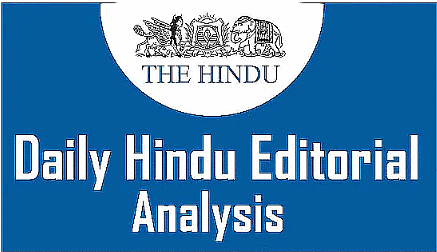The Hindu Editorial Analysis- 29th June 2024 | Current Affairs & Hindu Analysis: Daily, Weekly & Monthly - UPSC PDF Download

A Fresh Start
Why in News?
T he Goods and Services Tax (GST) Council was convened last week for the first time in nearly nine months. With 11 new State Ministers on board and a recalibrated NDA government at the Centre, the Council began afresh with a loaded agenda of clarifications, tweaks, forbearances, and other procedural changes, based on industry feedback and vetted by officials, that awaited its nod .
Overview of the GST Council Meeting
Recent Convening
- Timing and Context: The Goods and Services Tax (GST) Council met last week for the first time in nearly nine months.
- New Members: The meeting included 11 new State Ministers and a recalibrated National Democratic Alliance (NDA) government at the Centre.
- Agenda: The agenda was packed with clarifications, tweaks, forbearances, and procedural changes based on industry feedback and reviewed by officials.
The GST Council
- Constitutional Basis: The GST Council is established under Article 279A of the Indian Constitution.
- Formation Date: The Council was constituted on September 12, 2016.
- Chairperson: The Union Finance Minister chairs the GST Council.
- Members: Includes the Union Minister of State for Finance and Finance Ministers from each state.
- Decision-Making: Decisions require a three-fourths majority; the central government has one-third of the votes, and the states collectively have two-thirds.
- Primary Functions:
- Recommend tax rates, exemption lists, and threshold limits.
- Suggest special provisions for certain states.
- Resolve disputes arising from the implementation of GST.
- Meeting Frequency: The Council typically convenes periodically to review and make recommendations.
- Significance: Aims to ensure a uniform and simplified tax structure across India, promoting ease of business and reducing tax evasion.
- Impact: Has streamlined indirect taxes, replaced multiple state and central taxes, and facilitated a single national market.
Meeting Outcomes and Decisions
- Incomplete Agenda: The Council acknowledged it could not conclude deliberations on all accumulated items and resolved to meet again in August to address the remaining issues.
- Consensus Achievements: Despite the backlog, the Council reached consensus on several issues aimed at easing taxpayer burdens, reducing litigation, and providing tax relief.
Tax Relief and Exemptions
- Hostel Accommodation: Hostel accommodation costing up to ₹20,000 a month was exempted from GST.
- Railway Services: Railway services availed by passengers were also exempted.
- Uniform GST Rate: A uniform 12% GST rate was approved for packing cartons, milk cans, and solar cookers, eliminating confusing classification differences based on material or technologies.
Industry-Specific Measures
- Retrospective Measures: Several industry-specific measures were approved, some with retrospective effect.
- Waived Interest and Penalty: The Council waived interest and penalty on tax dues for the first three years of GST, provided they are paid by March 2025.
- Lowered Pre-Deposits: It lowered the stipulated pre-deposits for filing appeals, including those for the upcoming GST Appellate Tribunals.
- Error Correction Form: A new form was approved for taxpayers to correct errors or oversights in previous returns.
Key Reforms and Initiatives
- End of Anti-Profiteering Clause: The Council decided to end the anti-profiteering clause, which required firms to pass on any tax cut gains to customers.
- Biometric Authentication: Biometric-based Aadhaar authentication for all GST registrations was mandated in a phased manner across India. These measures aim to simplify the registration process and curb fraud through fake invoicing.
Anti-Profiteering Clause
- Purpose: The Anti-Profiteering Clause under GST aims to ensure that businesses pass on the benefits of reduced tax rates or increased input tax credits to consumers.
- Governance: This provision is governed by the National Anti-Profiteering Authority (NAA).
- Mandate: It mandates that any reduction in tax rates or gains from input tax credits must result in a commensurate reduction in the price of goods or services, preventing businesses from unduly profiting at the consumer’s expense.
Future Plans and Rate Rationalisation
- Rate Rationalisation Plan: The Council plans to take stock of the 2021 plan to rationalise the multiple-rate GST structure when it meets next.
- Expedited Reforms: It is crucial for the apex GST body to revive and expedite GST rate reforms.
- Inclusion of Excluded Items: The Council should also incorporate a road map to bring excluded items such as petroleum and electricity into the GST net while rejigging tax rates.
Conclusion
The GST Council’s recent meeting marked a significant step towards simplifying and decluttering the seven-year-old indirect tax regime. The ground-level impact of these decisions will depend on the fine print that follows, but the intent to ease taxpayer burdens and streamline processes is clear. The upcoming August meeting and future efforts to rationalise the GST structure and include currently excluded items will be essential in achieving a more comprehensive and efficient GST system.
|
38 videos|5288 docs|1117 tests
|
















